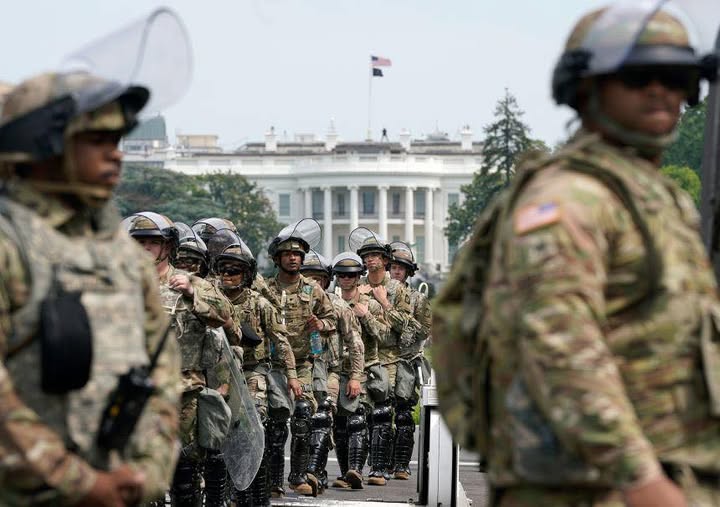Discover the details of the US Military’s deployment of National Guard troops to Washington DC under Trump’s orders, ensuring security and order in the capital.
Introduction
In a move that has sparked considerable debate and raised questions about the role of the military in domestic affairs, President Donald Trump has reportedly ordered the deployment of several hundred National Guard troops to Washington, D.C. The stated purpose of this deployment remains somewhat unclear, with varying reports citing reasons ranging from providing support for potential protests to bolstering security measures around federal buildings. This development comes at a time of heightened political tension and social unrest in the United States, adding another layer of complexity to an already volatile landscape.
Details of the Deployment
While the exact number of National Guard members being deployed is still fluctuating in various reports, sources suggest that it could be in the range of 300 to 500 personnel. These troops are expected to be drawn from National Guard units in the Washington, D.C., Maryland, and Virginia areas initially, with the possibility of additional units being called upon if the situation escalates.
The specific tasks assigned to these National Guard members have not been fully divulged. However, it is anticipated that their roles will primarily be in support capacities, such as providing logistical assistance, augmenting security at key infrastructure points, and being available to assist local law enforcement if necessary. Importantly, it remains unclear to what extent these troops will be directly involved in managing or responding to potential civil unrest.

Justifications and Official Statements
Official statements from the White House and relevant government agencies regarding this deployment have been somewhat vague. A brief press release issued late yesterday evening mentioned the President’s commitment to ensuring the safety and security of the nation’s capital. It further stated that the deployment of the National Guard was a precautionary measure taken in response to “credible information regarding potential disruptions.”
However, the nature of these potential disruptions and the specific intelligence that prompted this decision have not been publicly shared. This lack of transparency has fueled speculation and criticism from various quarters.
Concerns and Criticisms
The deployment of National Guard troops in this manner has drawn significant criticism from civil liberties advocates, legal scholars, and political opponents. Key concerns revolve around the potential for the militarization of domestic law enforcement and the implications for the Posse Comitatus Act, a federal law that generally prohibits the use of the U.S. military for domestic law enforcement purposes.
While the National Guard operates under a different legal framework and can be called upon by state governors or the federal government in certain circumstances, critics argue that deploying them in this context risks blurring the lines between military and civilian roles. They express concern that the presence of uniformed military personnel could escalate tensions during protests and potentially chill citizens’ rights to peaceful assembly and free expression.
Furthermore, the lack of clear justification for the deployment has led to accusations of political maneuvering. Some speculate that this move is intended to project an image of strength and order, particularly in light of recent public discourse and upcoming political events. Others fear that it could set a dangerous precedent for the increased militarization of domestic responses to civil unrest.
Supporters’ Arguments
Conversely, supporters of the deployment argue that it is a necessary step to ensure public safety and protect federal property in the face of potential threats. They point to instances in the past where National Guard deployments have been utilized to maintain order during times of civil unrest or natural disasters.
Proponents also emphasize that the National Guard members are under the command and control of civilian authorities and are trained to operate within the legal parameters governing their deployment. They argue that their presence can provide valuable support to local law enforcement agencies, freeing up those resources to focus on other critical tasks.
Historical Context
It is important to note that the deployment of the National Guard in Washington, D.C., is not unprecedented. In recent years, National Guard troops have been called upon for various reasons, including security support during presidential inaugurations, responses to natural disasters, and, more controversially, during periods of civil unrest.
However, each instance has been met with varying degrees of scrutiny and debate, particularly when the deployment involves a direct response to political protests. The current deployment under President Trump’s orders is likely to be viewed through the lens of these past experiences and the broader political climate.
Potential Implications
The implications of this deployment could be far-reaching. If the National Guard’s presence is perceived as heavy-handed or if they are used in a manner that infringes upon citizens’ rights, it could further inflame tensions and erode public trust. Conversely, if their role is strictly limited to support functions and they help to maintain order without escalating conflict, it could be seen as a prudent measure to ensure safety.
The long-term impact on the relationship between the military and civilian society will also be a key consideration. Repeated deployments of military personnel in domestic situations could normalize their presence in ways that some find deeply concerning for a democratic society.
Conclusion
President Trump’s decision to deploy National Guard troops to Washington, D.C., is a significant development that warrants close attention. While the stated aim is to enhance security and prepare for potential disruptions, the lack of transparency surrounding the specific threats and the potential for the militarization of domestic affairs raise legitimate concerns. As the situation unfolds, it will be crucial to monitor the role and actions of the deployed National Guard members and to ensure that all actions are consistent with the Constitution and the principles of a democratic society. The coming days and weeks will likely provide further clarity on the scope and impact of this decision.
